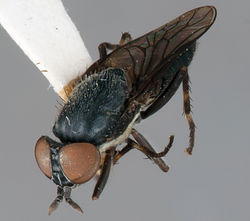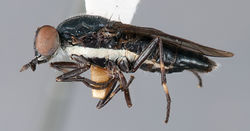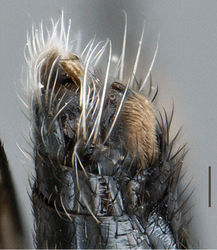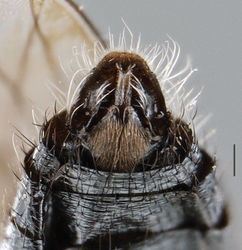Difference between revisions of "Vomerina comapenis"
m (Imported from ZooKeys) |
m (1 revision) |
(No difference)
| |
Latest revision as of 12:30, 30 August 2012
| Notice: | This page is derived from the original publication listed below, whose author(s) should always be credited. Further contributors may edit and improve the content of this page and, consequently, need to be credited as well (see page history). Any assessment of factual correctness requires a careful review of the original article as well as of subsequent contributions.
If you are uncertain whether your planned contribution is correct or not, we suggest that you use the associated discussion page instead of editing the page directly. This page should be cited as follows (rationale):
Citation formats to copy and paste
BibTeX: @article{Winterton2012ZooKeys218, RIS/ Endnote: TY - JOUR Wikipedia/ Citizendium: <ref name="Winterton2012ZooKeys218">{{Citation See also the citation download page at the journal. |
Ordo: Diptera
Familia: Therevidae
Genus: Vomerina
Name
Vomerina comapenis Winterton & Ferguson, 2012 sp. n. – Wikispecies link – ZooBank link – Pensoft Profile
Type material
– Holotype male, AUSTRALIA: New South Wales: Boonanghi State Forest, 24 km W Kempsey, vic.[inity of] ‘The Blowhole’ [-31.0747, 152.5663], 8.x.1993, G. & A. Williams, riparian zone, dry rainforest (AM).
Diagnosis
Wing dark infuscate; frons slightly projecting around antennal base; scape cylindrical, shorter than flagellum, not bulbous; black setae on katatergite; white pubescence on pleuron extending onto abdomen; male abdomen black apically; articulated inner gonocoxal process present, greatly reduced.
Description
Body length: 7.0 mm. Head. Frons flat, surface rugose-striated medially, wider than ocellar tubercle at narrowest point, antennal base positioned low on frons; lower frons and face slightly protruding around antennal base; frons glossy black, silver-grey pubescence along eye margin; short setae sparsely distributed on lower frons; narrow medial stripe of silver pubescence around antennal bases on face, parafacial and along margin of eye; ocellar tubercle flat, glossy black; occiput concave, black, overlain with dense grey pubescence; single row of very short, black postocular setae; gena black, overlain with white pubescence admixed with white, elongate setae; palpus and labellum brown-black with sparse, dark setae; antenna black, only slightly shorter than head; short dark setae on scape and pedicel; scape shorter than flagellum length, cylindrical, with grey pubescence; flagellum conical with brownish suffusion. Thorax. Black, scutum and scutellum overlain with grey-black pubescence admixed with relatively short, dark setae; scutum with narrow, faint dorsocentral and medial stripe of pale grey pubescence; scutal macrosetae black; pleuron, sternum and coxae glossy black; distinctive broad stripe of matte white to silver pubescence along pleuron length; elongate pale setae on proepisternum, katepisternum and coxae, black setae on anepisternum and katatergite; legs black with pale setae of various lengths on femora, dark yellow band midway on mid and hind tibiae and basitarsus; wing smoky infuscate; venation dark; haltere brown-black; scutal chaetotaxy (pairs): notopleural, 4; supra alar, 1; post alar, 1; dorsocentral, 1–2; scutellar, 1. Abdomen. Glossy black, uniform scattered pale setae, longer laterally, white-grey pubescence laterally on sternites 1–3. Male genitalia. Gonocoxite with outer gonocoxal processes reduced; articulated inner gonocoxal process greatly reduced; gonostylus broad; ventral lobe large, plowshare-shaped, projecting posteroventrally with velutinous pubescence on ventral surface (Figs 3–4).
Etymology
The species epithet is derived from the Latin, coma hairy; penis, intromitant organ; referring to the vestiture of the male genitalia.
Comments
Vomerina comapenis sp. n. is muchsmaller in body size to Vomerina humbug and can be further distinguished by the frons being only slightly projecting, a non-bulbous antennal scape and darker wings. This species is distinguished from Vomerina micora sp. n. by the lateral velutum stripe extending onto the abdomen, abdomen uniformly black, and the scutum lacking grey pubescent dorsocentral stripes. The female is unknown.
Original Description
- Winterton, S; Ferguson, D; 2012: New species of Vomerina Winterton (Diptera, Therevidae, Agapophytinae) from Australia ZooKeys, 218: 65-75. doi
Images
|



